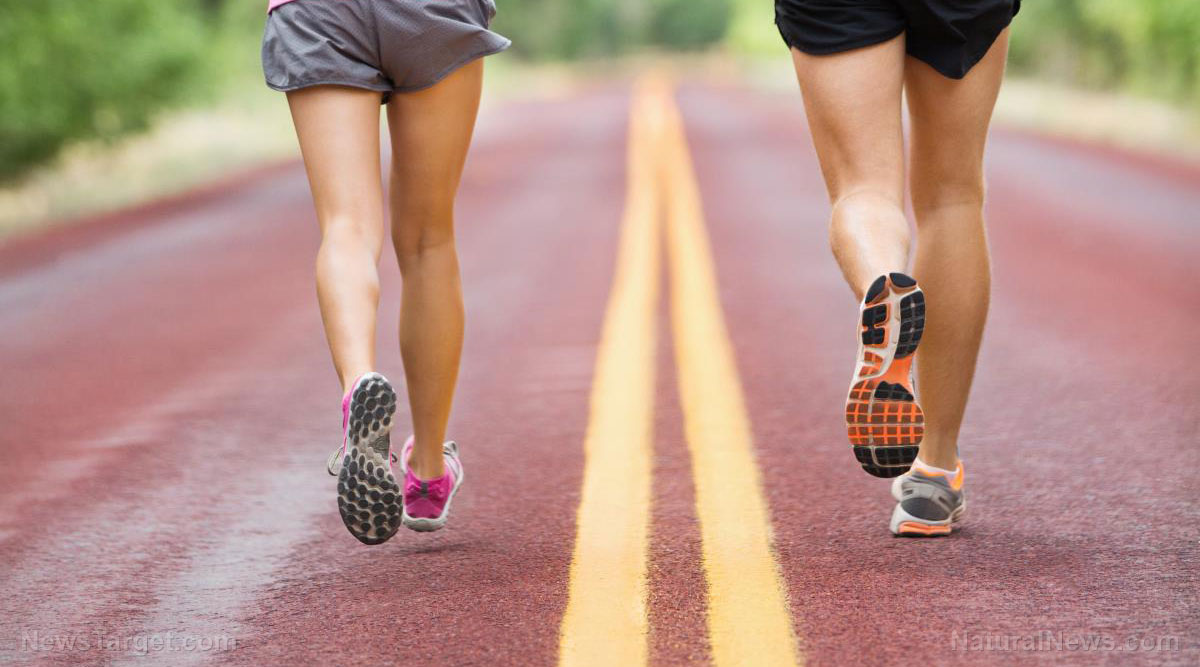Jogging for just 30 minutes a day can knock years off your biological clock
05/21/2017 / By Earl Garcia

High physical activity levels may help stave off the effects of aging, a recent study published in Preventative Medicine revealed. According to the study, jogging for 30 to 40 minutes daily, five days a week may lead to reduced shortening of telomeres and cellular aging. Telomeres act as protective caps at the ends of chromosomes. Scientists likened its functions to an aglet, the plastic tips found it shoe laces. They essentially prevent chromosomes from fraying or sticking to other chromosomes.
The scientific community has long established the telomeres serve as biological markers for aging. According to scientists, the body’s aging process diminishes the length of these protective telomeres. Inadequate exercise may trigger the onset of telomere shortening though oxidative stress. Oxidative stress is a state where the body can longer compensate for cellular damage caused by free radicals.
In order to examined the effects of exercise on aging, a researcher from the Brigham Young University in Provo, Utah pooled data from the National Health and Nutrition Examination Survey with a total cohort population of nearly 9,000 participants. The expert examined the participants’ telomere length and their participation in 62 exercise activities over a period of one month.
The results showed that participants who had high physical activity levels exhibited telomere lengths representing a biological age of nine years less compared with their sedentary counterparts. The highly active group also showed telomere lengths with a biological age of seven years less compared with those who were only moderately active. The researcher also noted that telomere lengths for both moderately active and sedentary participants did not show a significant difference.
The power of the elements: Discover Colloidal Silver Mouthwash with quality, natural ingredients like Sangre de Drago sap, black walnut hulls, menthol crystals and more. Zero artificial sweeteners, colors or alcohol. Learn more at the Health Ranger Store and help support this news site.
“If you want to see a real difference in slowing your biological aging, it appears that a little exercise won’t cut it. You have to work out regularly at high levels. We know that regular physical activity helps to reduce mortality and prolong life, and now we know part of that advantage may be due to the preservation of telomeres,” said researcher Professor Larry Tucker in MedicalNewsToday.com.
Intensive exercise benefits the skin and the brain too
Previous studies have shown that high exercise levels are beneficial for skin and brain health. In fact, a study conducted by researchers at the McMaster University in Ontario, Canada revealed that exercise may help keep the skin in good condition. To carry out the study, the research team enrolled 29 male and female volunteers aged 20 to 84 years old. Half of the participants were instructed to complete at least three hours of moderate or vigorous physical activity every week, while the other half remained mostly sedentary.
The researchers found that physically active participants showed visibly better skin conditions similar to people in their 20s and 30s. This effect was also evident even if the participant was older than 65 years.The experts then prompted the sedentary group to undergo intensive exercise. The research team found that the effects of physical activity was replicated on the skin samples of previously sedentary participants. These findings were presented at The American Medical Society for Sports Medicine.
Another study published in Neurology revealed that increased physical activity may benefit the cognitive function in older people. According to the study, older individuals who had high exercise rates displayed episodic memory functions that were equivalent to 10 years younger during a five-year follow-up compared with those who only did light exercise and those who had been sedentary through out the study period. “If you’re thinking strolling, you’re not going to make it. You need to do a significant amount of exercise and get your heart rate up to fit into the moderate-to-heavy category,” lead author Clinton B. Wright wrote in LATTimes.com.
Sources include:
Tagged Under: exercise, firness, health, Men's Fitness, physical activity, Women's Fitness




















